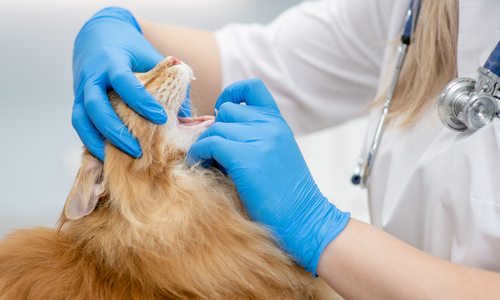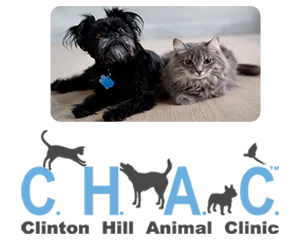
Learn How to Improve Your Pet's Oral Health
How healthy are your pet's pearly whites? Without proper dental care, your furry friend may develop painful infections and even lose teeth. These tips will help you protect your pet's teeth and gums.
Brush Your Pet's Teeth
Brushing removes plaque, a clear bacterial film that constantly coats the teeth. Plaque is a factor in tooth decay, but unlike humans, dogs and cats rarely develop cavities.
Unfortunately, that doesn't mean that it's safe for plaque to remain on their teeth. Plaque turns into tartar if it's not removed within a week or two. Tartar, a hard, yellow deposit, irritates the gums and can cause inflammation and periodontal (gum) disease.
Daily brushing gets rid of plaque, preventing it from ever transforming into tartar. It's never too late to start brushing your cat or dog's teeth. Although it's easier to start brushing when your pet is a puppy or kitten, many older animals will eventually permit you to brush their teeth if you start the process gradually.
You may find brushing is easier if you:
- Let Your Furry Friend Lick or Smell the Toothpaste. Place a dab of pet toothpaste on your finger or a pet toothbrush and let your cat or dog sniff or lick it. Never use human toothpaste, as the ingredients can be toxic to animals. Pet toothpaste is a much better choice. The toothpaste contains flavors pets find appealing, like chicken, beef, seafood, and peanut.
- Rub Your Pet's Teeth. Once you've found a toothpaste flavor your pet likes, place a tiny amount on your finger and briefly rub the paste across the gums. Offering a treat when you're through may make teeth cleaning more acceptable to your pet. Keep in mind that you're not actually trying to clean your pet's teeth at this point. Rubbing the gums with the paste helps your furry friend adjust to the sensation of brushing.
- Try Brushing When Your Pet Is Comfortable. Squirt a pea-sized amount of toothpaste on a pet toothbrush or a finger brush, and gently brush your pet's teeth and gum line using a circular motion. Although both types of brushes remove plaque, a traditional toothbrush may be more effective in removing plaque at the gum line.
Patience is a must when you're starting an oral hygiene routine. It may take a week or two until you can progress from one step to another.
Choose Tooth-Friendly Foods and Treats
Some types of foods, treats, gels, sprays, and additives are specially formulated to prevent plaque and tartar build-up. Talk to your pet's veterinarian about the best foods and products for good oral health.
Schedule Checkups and Teeth Cleanings
Your oral health would suffer if you never saw the dentist or had your teeth cleaned. Pets need checkups and cleanings too. During your pet's exam, the veterinarian will look for signs of trouble, such as broken teeth, swollen or receding gums, bleeding, or loose teeth. Your vet may also recommend X-rays, as some tooth problems may not be obvious.
Teeth cleaning, recommended at least once a year, reduces your pet's risk of developing periodontal disease. The disease can cause bad breath, make chewing painful, and may infect or damage gum tissue, bones, ligaments, and teeth. If gum disease isn't treated, your pet's teeth may even fall out.
Periodontal disease may also increase the likelihood that your dog or cat will develop diabetes, or kidney, liver, or heart disease. According to an article in Today's Veterinary Practice, 80 percent of dogs and 70 percent of cats have some form of periodontal disease by age 2. Among dogs, toy and small breeds are most likely to develop the disease.
Although brushing your pet's teeth removes plaque above the gum line, plaque and tartar may still be present below the gums. A dental cleaning is the only way to remove the substances from under the gums.
Dental cleanings are performed under anesthesia. Blood tests are required before cleanings to ensure that your pet is in good health and can tolerate the anesthesia. Cleanings offer a simple, safe way to protect your pet's oral and general health.
Oral care is an essential aspect of good health. Let us know if your pet is due for a cleaning or you're concerned about tooth or gum problems.
Sources:
